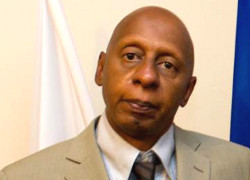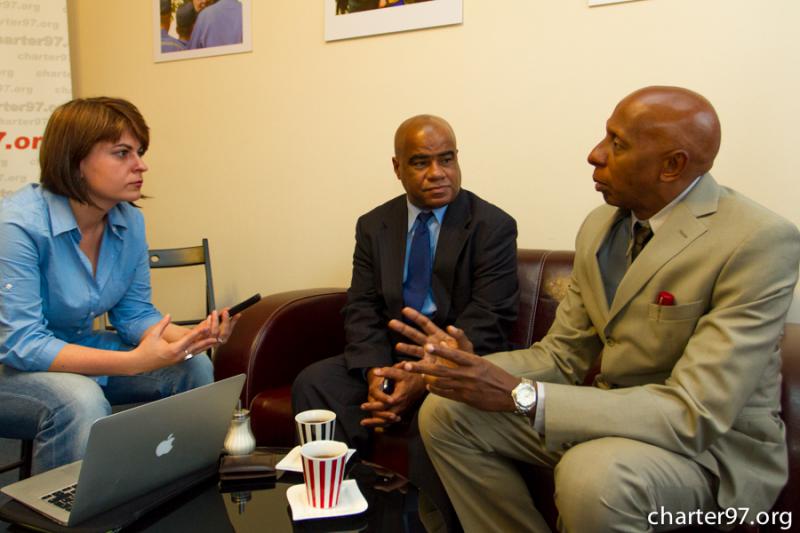Guillermo Fariñas: Belarusian opposition has its own army
- 18.06.2013, 0:27
- 5,737

The legendary Cuban dissident gave an interview to charter97.org on the eve of tbeing awarded the Andrei Sakharov Prize by the European Parliament .
Guillermo Fariñas, who spent more than 11 years in prison, survived 23 hunger-strikes demanding the release of political prisoners, talked to the editor-in-chief of charter97.org Natallia Radzina.
- Guillermo, you arrived to Poland several days ago. What is the purpose of your trip?
- One of the reasons is that recently the oppositional organization Cuban Patriotic Union has been revived and the number of its members is growing. Poland is well-known for its trade union movement Solidarity that united almost one million people. We came here to study their experience and analyze the methods that they used. We’ll apply the knowledge that we will get in our conditions.
- What can you tell us about the current situation in Cuba? Have there been any changes recently?
- The difference is that today repressions in the country are more clandestine. Raul Castro’s regime often uses military units. During his rule, Fidel Castro tried to prevent any discontent, and those who disagreed with his politics were openly and illegally persecuted. Today Raul Castro is trying to involve the nation in the fight against dissidents. Para-military organizations are being established; their members attack and beat up the opposition during demonstrations. The police, supposed to protect people from things like that, takes dissidents to police station, arrests them and charges with public disorder. This method is used to create the atmosphere of terror.
The recent repressions that the opposition has faced resulted in a great number of prisoners of consciousness. Opposition activists are kept in prisons together with criminals convicted for severe crimes. Some of political prisoners have already become legends of the criminal world. However, these actions are alarming. Raul Castro’s regime tries to break its opponents physically and psychologically. It takes long time to recover after such assaults. Many people have to leave Cuba or stop their political activity because they are afraid for their families.
- How should the West act regarding Cuba?
- Today democratic countries, including Europe, know about our problems and understand them. Politicians realize that our country is still a dictatorship and they agree that this is wrong. Dictatorships are a dirty stain for democracy. That is why we must get Western countries to realize that we cannot change the situation in Cuba on our own. Today there are problems in the politics of Western countries regarding the Cuban powers. The position of the U.S. and Canada is clear. As for the European Union, there are countries that don’t want to go on with a single strategy and suggest developing bilateral relations with the Cuban government. They have obviously forgotten about the human rights abuses in our country.
Belarus is in Europe. You have more possibilities to influence the European politics. The situation in Belarus is a problem for the entire continent. Cuba with its problems is on another continent, and that is why it is so hard for Europe to develop a single position. But it should be single, both regarding Belarus and Cuba. The powers must respect human rights. This is the message that we try to deliver to all European politicians that we meet.
- Sometimes when we tell European politicians that targeted economic sanctions should be applied to the Belarusian dictator, they answer: we have applied such sanctions to Cuba and it gives no result.
- The best proof that the sanctions work is the fact that the dictatorship is doing a media campaign demanding that they are lifted. The dictatorship claims that the limitations strangle the economy. Some actions are taken on the diplomatic level.
It is typical for the present situation in Latin America that many of the continent’s countries are “contaminated” with the Venezuelan regime. We need a cleansing process. But at the same time, we don’t want this process to lead to violence.

I envy, in a good way, the oppositional movement in Belarus. You already have your own “army” – the 60 thousand people who came to the Square on December 19, 2010. If the West applied real economic sanctions against the Belarusian powers, the situation would change. 60 thousand would have become 600 thousand. There is no army that can hold this power.
We would love to take such people in Cuba. We really need an “army” like that in our country. With them, we could take over the streets. Of course, many would be repressed or murdered, but there would be those who could continue the work.
Even now we could organize a demonstration of support of the Belarusian opposition, and you could hold a similar rally in Belarus to support the Cubans. We must show that democracy is equally important for your country, for Cuba and Myanmar. I believe that democracy will prevail in Belarus sooner, and that we will have to come to you to learn. I hope your doors will be open.
- What is your opinion of the Catholic Church’s politics in Cuba? Popes have visited your country. What is the relationship between the Catholic Church and the dictator?
- The Catholic Church is the only confession in Cuba. Priests can preach, and people can openly show that they belong to the Church. But the relations between the congregation and cardinal Jaime Ortega who is the head of the Church have become a little bit odd. He betrayed several Catholic activists. For example, he served a mess for the health of Hugo Chavez or Fidel Castro, but he didn’t do it for the Cuban political prisoners Orlando Zapata, Juan Soto Garcia and other who died in jails after hunger-strikes and assaults by the police.
75 political prisoners arrested during the “black spring” of 2003 were exposed to pressure in prison. They announced a hunger-strike. Meanwhile, the Church never agreed to help them. According to the law of the Church, this fact alone is enough for resignation of cardinal Jaime Ortega. There have been other cases. Many priests have openly spoken against the regime and condemned the Cuban powers. As a punishment, they were sent to work in the middle of nowhere.
Today we cannot count on the help of the Catholic Church in democratization of Cuba. Only a small number of activists of the opposition believe that we can cooperate with the Church.
- How did you become a dissident? Maybe today after 11 years in prison there is something you regret?
- I was a devoted communist. I truly believed in communism. When I was a young man, I joined the Union of Young Communists of Cuba. In 1980 the mass escape of Cubans to the U.S. became known to the public. I couldn’t believe that such a great number of people wanted to leave the country. At that time I was a student of the military college in Havana, and control over the students’ studies was one of my responsibilities. The place was so corrupted that it’s hard to imagine. In the college, I signed a contract to serve as an officer in the Cuban army for 25 years. Then I was commanded to Angola, where I saw horrible things: Cuban military men killed peaceful peasants in real massacres. And it made me recall Belarus, because in Cuba, we had many soviet movies that showed the Nazis terror against the Belarusians. I was terrified by what I saw.
In 1979, when I was sent to the USSR, Tambov, to study, I was struck by the level of repressions that I saw there. The city was split in two halves, one with common residents, and one with the military. Local people lived in tremendous poverty while the military men were paid huge money. The political department of the Cuban Embassy and the military counter-intelligence did everything to prevent any contacts of Cuban students with the locals. Nevertheless, we visited those parts of the city that were closed for us. I could read Russian well back then and read “Animal Farm” and “1984” by George Orwell, many other samizdat-books.
I often tried to figure out when exactly I became a convinced anti-communist, and I realized that it happened in Tambov. At the same time I had to pretend being a communist. I served in the army and if my views had been revealed, I would have been shot, and my family would have been told that I had died in a battle. Once I had an incident with paralyzing gas that caused an epilepsy attacks. Since it is incompatible with military service, I had to retire.
In 1984 I developed a strong interest in psychology and entered a university. I was an active advocate of perestroika and glasnost. I realized that Russia needed changes, simply because of the very high levels of alcoholism, prostitution, violence and corruption, even in the military.
I saw what was going on in the university. Students had to bribe their teachers to get good grades. I didn’t give any bribes, and twice I was close to be expelled.
In 1989, when General Arnaldo Ochoa was sentenced to death for treason, I publicly critiqued the sentence. I was expelled from the Union of Young Communists. Since then, I have been a dissident. Since it was impossible to get a job in Santa-Clara where I lived, I had to move to Havana that still was a rather cosmopolitan city back then.
Struggle against the regime seems to be my destiny. I was elected the head of the trade union of the hospital where I worked after my graduation for criticizing the hospital management. I started to criticize corruption, but the head of the hospital was a woman who was a member of the central committee of the communist party, and so I had to go to prison. That’s how my life as a dissident began.
- Guillermo, after the collapse of the Soviet Union, the dictator regime of Castro lost almost its entire support. How could the regime survive?
- Only with Europe’s help. For some reason, Spanish prime-minister Felipe González believed that a dictator can change, and started to lobby Castro in Europe. He managed to persuade European politicians that Castro would reform Cuba, could be involved in a dialog with Spanish-speaking countries and through this dialog realize changes in Cuba. Castro joined this game, but at the same time he was working to secure Hugo Chavez’, his future sponsor, coming to power. As the president of Venezuela, Chavez basically funded the Cuban regime.
- I’d like to congratulate you on the award of the European Parliament Andrei Sakharov 's Prize “Freedom of Thought”. We are very glad that you finally could receive it.
- Thank you. This is an important recognition of our struggle. I know that the Belarusian opposition and independent journalism also received the award.










